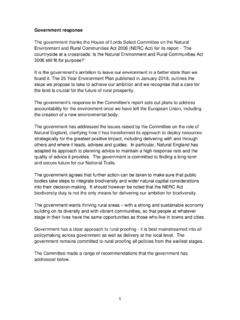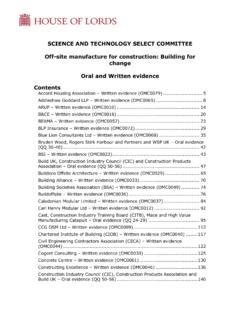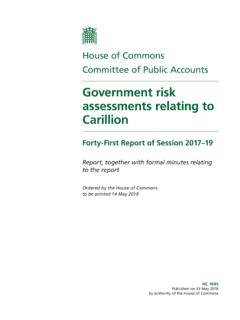Transcription of Factsheet M1 Members Series You and Your ... - UK …
1 Contents Introduction 2 Who is my MP? 2 Contacting your MP 2 Your MP 3 Meeting your MP 3 What can your MP do to help you? 4 How does your MP deal with your problems? 6 Raising matters in the house 7 Petitions 7 Campaigns and lobbying 8 The responsibilities of your MP 8 Visiting the Palace of Westminster 9 Appendix 10 Contact information 11 Feedback form 12 Factsheet M1 Members Series Revised August 2010 house of Commons information office You and Your MP This Factsheet has been archived so the content and web links may be out of date. Please visit our About Parliament pages for current information . The house of Commons is made up of 650 Members of Parliament (MPs), each representing one constituency. This Factsheet gives an introduction to their work and the ways in which they might help you.
2 August 2010 FS Ed ISSN 0144-4689 Parliamentary Copyright ( house of Commons) 2010 May be reproduced for purposes of private study or research without permission. Reproduction for sale or other commercial purposes not permitted. You and Your MP house of Commons information office Factsheet M1 2 Introduction The house of Commons is made up of 650 Members of Parliament (MPs), each representing one constituency. This Factsheet gives an introduction to their work and the ways in which they might help you. Who is my MP? You can find out who your MP is by asking in your local public reference library or at your local town hall. You can also telephone the house of Commons information office (020 7219 4272). If you have access to the Internet, and know your full postcode, you can find out who your MP is via the Find Your MP service at: Contacting your MP The first thing to consider, when thinking about contacting your MP, is whether he or she is the right option.
3 There are a variety of options to consider, some of which may be of more direct help than an MP. If your problem is with services provided by your local council, then one of your local councillors will often be of more direct help than a Member of Parliament. Your local library or town hall should be able to provide you with your councillor's name and contact information . The Find Your MP service also has an option to discover your other representatives. If your problem is of a more general nature or you are uncertain where to go for advice, then your nearest Citizens Advice Bureau will be able to guide you. Alternatively, your council may run its own general advice centre or be able to direct you towards an independent centre. In Scotland, Wales and Northern Ireland there are also devolved bodies which have direct legislative responsibilities for many issues.
4 Members of Parliament while often willing to become involved in issues where local procedures have failed or have encountered seemingly intractable problems would prefer that the proper first steps are engaged before they take an interest. If your issue does require the involvement of an MP then the best way to make contact is to write to him or her at: [Name of Member] house of Commons, London SW1A 0AA You can check Member s titles by looking up your Member on the Alphabetical list of Members on the Parliament website. Some are Members of the Privy Council and have the title Right Honourable (usually abbreviated to Rt Hon). A letter to Keith Vaz MP would therefore be addressed to: Rt Hon Keith Vaz MP And the opening salutation would simply be: Dear Mr Vaz All MPs have Westminster offices and will make arrangements for their mail to be dealt with or redirected when they are away from London, so it is much better to write to them there than in their constituency office or at their home address.
5 Writing You and Your MP house of Commons information office Factsheet M1 3 a letter about a problem, rather than telephoning, is a good idea as you can explain things clearly and your MP will have the written details of your case which he or she may find it useful to refer to later. You can telephone your MP's office at the house of Commons by telephoning the switchboard (020-7219 3000) and asking to be connected to the appropriate MP s office . It is worth remembering that Members ' staff are likely to be very busy and may work in a large noisy office so it may not be easy for them to note down complicated and lengthy information . For this reason, it may be better to write. It is also sometimes possible to contact your MP by telephoning his or her local constituency office . Once again, your local library or town hall and, in cases of difficulty, the house of Commons information office , should be able to advise you of the constituency contact point.
6 The house of Commons does not have a general fax number, although some MPs will have their own fax machines. There is no central record of MPs fax numbers, so you must telephone your MP's office first if you wish to try to fax some information . Many MPs can also be contacted by e-mail. You can contact an MP's office or the house of Commons information office to ascertain whether they have an e-mail address, or you can check the list of MPs on the Internet at the Parliamentary Web sit: Each MP name links through to their biographical and contact details; this information can also be accessed via the Find Your MP service (see above). Whichever method you choose, you should generally only contact your local MP as MPs will deal only with the problems of their own constituents and not with those of another MP s constituents.
7 This is because the British parliamentary system is founded on the principle that one Member represents a single constituency, and that her or his relations with constituents are very much a preserve other Members should not interfere with. Your MP The size of constituencies varies according to a number of factors but on average a constituency will contain approximately 68,500 electors. Your MP gained the right to represent your constituency by receiving more votes than any of the other candidates at the last general election or by-election. Once elected, the job of an MP is to represent the people of his or her constituency (constituents) in Parliament, whether or not they voted for him or her. You only have one MP so even if you voted for one of the other candidates and you disagree with the views of your MP's party, your MP is still there to help you with all matters for which Parliament or central government is responsible.
8 Meeting your MP When the house of Commons is sitting, you will be allowed access to the Central Lobby to see your MP. It is best to make an appointment before doing so however, as your MP might have other appointments or engagements elsewhere and not be available to see you. The majority of MPs have times when they are available at different places within their constituency for constituents to meet and discuss problems with them. These You and Your MP house of Commons information office Factsheet M1 4 sessions are often called surgeries and details are usually advertised in local papers and public libraries. Your MP's secretary or local party office will also be able to advise you when your MP will next be holding a surgery. What can your MP do to help you? Many people think that their MP is there to solve all their problems for them: this is not the case.
9 MPs are there to help only with those matters for which Parliament or central government is responsible. As stated above, for many matters, the appropriate first step would be to contact your local councillor or representative in your devolved Assembly or Parliament. In England, if your problem is not local in nature (such as council tax, or local social services, or day to day problems in schools) but instead concerns central government policies (such as the National Health Service, HM Revenue and Customs who collect the bulk of tax and pay child benefit and tax credits, and the Department of Work and Pensions who deal with issues such as benefits, pensions and national insurance) then you should contact your Member of Parliament. In Scotland, there are a large number of areas which have been devolved to the Scottish Parliament by the Scotland Act 1998 and Members of the Scottish Parliament have the responsibilities for legislating in those areas and who would be best placed to listen to problems and potentially offer solutions.
10 Once again, local problems should be taken to local councillors but those relating to most health service and benefits issues should be taken to MSPs rather than MPs. The Scottish Parliament provides a useful summary of legislative matters that the Parliament covers on its In Wales, The Government of Wales Act 2006 introduced the ability of the National Assembly for Wales to make its own legislation on devolved matters such as health, education, social services, local government. The Assembly must first pass a Legislative Competence Order (LCO) (in conjunction with both Houses of Parliament), to gain the right to make legislation in certain areas. The Assembly can then pass Assembly Measures, which are similar to Bills in Westminster2 The Welsh Assembly will also implement many of the Regulations and Orders that derive from Westminster based Acts of Parliament.












